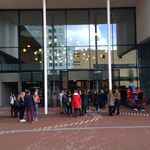Representation and right-wing violence: Evidence from Nazi street brawls
ACCS lunch lecture
- Date
- 2 May 2024
- Time
- 12:00 -13:30
- Room
- A1.04
This research, conducted by Felix Haass and colleagues Alexander de Juan, Daniel Bischof and Henry Thomson, investigates this question in the context of the July 1932 Reichstag elections in Weimar Germany. The researchers match the home towns of Nazi party candidates to locations of street violence from digitized Prussian police records. Exploiting the randomness between candidates who did and did not receive just enough votes to attain a Reichstag seat they identify the effects of Nazi representation in parliament on street brawls in the Weimar Republic. Initial results indicate that parliamentary representation led to more street violence in elected candidates' home towns, especially when NSDAP candidates had links to the Nazi paramilitary organization, the SA.
These findings have important implications for our understanding of post-election violence, consequences of right-wing representation, and democratic stability.
Learn more about this research project and its findings in Felix’ ACCS lecture on 2 May. Lunch will be served for all participants. Please register your attendance by using the link provided.

About the speaker
Felix Haass is an associate professor at the University of Oslo. He studies causes and consequences of wars and political violence as well as autocratic politics. Recent research has investigated the impact of war on nationalism, consequences of war crimes for political behavior and the effectiveness of indoctrination on regime loyalty in the former German Democratic Republic. His research has been published in the American Political Science Review, the Journal of Politics, World Politics, the British Journal of Political Science, and Comparative Political Studies, among others.
